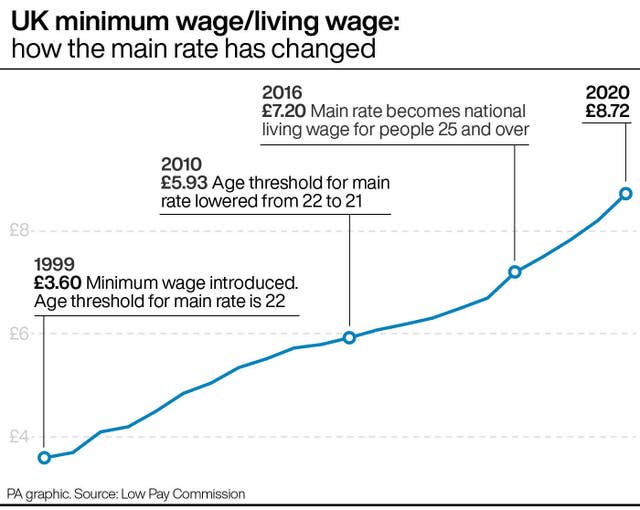Business groups wary ahead of ‘biggest ever’ increase in national living wage
The national living wage will rise from £8.21 to £8.72 in April.

Almost 3 million workers are set to benefit from the “biggest ever” increase in the national living wage, ministers have said.
However, employers’ organisations warned that the above-inflation increase – due to take effect in April – would “pile further pressure” on businesses’ cashflows.
According to data from the independent Low Pay Commission, the 51p increase in the national living wage to £8.72 from £8.21 is the largest since the rate was introduced in April 2016.
The previous biggest increase was in April 2016, when the rate rose by 50p from £6.70 to £7.20 per hour.

The national living wage is the name for the minimum wage level payable to adults over the age of 25. Those under 25 and apprentices are paid at a lower rate.
Younger workers who receive the minimum wage will see their pay boosted by between 4.6% and 6.5% depending on their age, with 21 to 24-year-olds seeing a 50p increase from £7.70 to £8.20 an hour.
Hannah Essex, co-executive director at the British Chambers of Commerce, said an above-inflation pay increase came at a difficult time for businesses.
She said: “Businesses want to pay their staff a good wage. But many have struggled with increased costs in a time of great economic uncertainty.
“Raising wage floors by more than double the rate of inflation will pile further pressure on cashflow and eat into training and investment budgets.”
Craig Beaumont, Federation of Small Businesses director of external affairs, urged ministers to implement promised pro-business measures before the increase takes effect.
He said: “This Government has promised a reduction in the jobs tax through an increase in the employment allowance.
“With a national living wage increase of this size now on the horizon, it’s critical that it delivers swiftly.”
Boris Johnson, however, hailed the “biggest ever cash boost to the national living wage” – first announced by Chancellor Sajid Javid in September.
The Prime Minister said: “Hard work should always pay, but, for too long, people haven’t seen the pay rises they deserve.”
Mr Javid said the wages of the lowest-paid full-time workers had increased by £3,600 since the national living wage was introduced in 2010.
He added: “But we want to do more to level up and tackle the cost of living, which is why the national living wage will increase further to £10.50 by 2024 on current forecasts.”
The Government said nearly three million workers were set to benefit from the increases and it was “on track” to meet its current target for the NLW to reach 60% of median earnings by 2020.
The new rate starts on April 1 2020 and will result in an increase of £930 over the year for a full-time worker on the national living wage.
Nye Cominetti, an economic analyst at the Resolution Foundation think tank, welcomed the increase but warned it was “not risk-free”.
He said: “It should be matched by a renewed commitment to swiftly evaluating evidence of the impact of such large and sustained minimum wage rises – and acting on that evidence if problems emerge.”
However Frances O’Grady, general secretary of the Trades Union Congress, said a £10-per-hour national living wage was needed immediately.
She said: “This is a long-planned raise, but it’s also long overdue. Workers are still not getting a fair share of the wealth they create.”
Katherine Chapman, director of the Living Wage Foundation, said the increase still did not take the minimum wage up to £9.30 – or £10.75 in London – which the charity calculates is the base level needed to cover the cost of living.
She said: “There are still over 5 million workers in the UK earning less than the real living wage.
“There is a still a gap between the Government minimum and the real living wage, independently calculated based on what it costs to live.”





